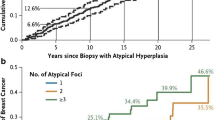Abstract
▴ Anastrozole, a nonsteroidal selective aromatase inhibitor, has recently been approved in the US and several other countries for the adjuvant treatment of postmenopausal women with hormone receptor-positive early breast cancer.
▴ In the Arimidex, Tamoxifen Alone or in Combination (ATAC) trial, anastrazole 1mg was significantly more effective than tamoxifen 20mg or combined treatment (17 and 19% relative risk reduction) for disease-free survival in postmenopausal women with early breast cancer.
▴ Anastrazole was also significantly more effective than tamoxifen for time to tumour recurrence and the odds of a primary contralateral tumour as a first event.
▴ During the first 2 years of treatment with anastrozole, tamoxifen or the combination, patient quality of life was similar in all treatment groups.
▴ Compared with tamoxifen, anastrozole was associated with a significantly lower incidence of vaginal bleeding, vaginal discharge, hot flushes, endometrial cancer, ischaemic cerebrovascular events, venous thromboembolic events and deep vein thrombosis including pulmonary embolism; tamoxifen was associated with a lower incidence of musculoskeletal disorders and fracture.



Similar content being viewed by others
References
Buzdar A, Howell A. Advances in aromatase inhibition: clinical efficacy and tolerability in the treatment of breast cancer. Clin Cancer Res 2001 Sep; 7: 2620–35
Tsangaris T, Robert N, Love N. Update on treatment of early breast cancer: the trend toward less surgery, more systemic therapy. Postgrad Med 1999 May 15; 105: 81–102
Buzdar A. The place of chemotherapy in the treatment of early breast cancer. Br J Cancer 1998 Sep; 78 Suppl. 4: 16–20
AstraZeneca Pharmaceuticals LP. Arimidex® (anastrozole) tablets: prescribing information [online]. Available from URL: http://www.fda.gov/cder/approval/index.htm [Accessed 2002 Sep 7]
Wiseman LR, Adkins JC. Anastrozole: a review of its use in the management of postmenopausal women with advanced breast cancer. Drugs Aging 1998 Oct; 13(4): 321–32
Geisler J, King N, Dowsett M, et al. Influence of anastrozole (Arimidex), a selective, non-steroidal aromatase inhibitor, on in vivo aromatisation and plasma oestrogen levels in postmenopausal women with breast cancer. Br J Cancer 1996 Oct; 74(8): 1286–91
Geisler J, Haynes B, Anker G, et al. Influence of letrozole and anastrozole on total body aromatization and plasma estrogen levels in postmenopausal breast cancer patients evaluated in a randomized, cross-over study. J Clin Oncol 2002 Feb 1; 20: 751–7
Geisler J, Detre S, Berntsen H, et al. Influence of neoadjuvant anastrozole (Arimidex) on intratumoral estrogen levels and proliferation markers in patients with locally advanced breast cancer. Clin Cancer Res 2001 May; 7: 1230–6
Miller WR, Stuart M, Dixon JM. Anastrozole (‘Arimidex’) blocks oestrogen synthesis both peripherally and within the breast in postmenopausal women with large operable breast cancer. Br J Cancer 2002 Oct 21; 87(9): 950–5
Dowsett M, Donaldson K, Tsuboi M, et al. Effects of the aromatase inhibitor anastrozole on serum oestrogens in Japanese and Caucasian women. Cancer Chemother Pharmacol 2000 Jul; 46: 35–9
Plourde PV, Dyroff M, Dukes M. Arimidex®: a potent and selective fourth-generation aromatase inhibitor. Breast Cancer Res Treat 1994; 30(1): 103–11
Yates RA, Dowsett M, Fisher GV, et al. Arimidex (ZD1033): a selective, potent inhibitor of aromatase in postmenopausal female volunteers. Br J Cancer 1996; 73(4): 543–8
Martinetti A, Bajetta E, Buzzoni R, et al. Biological study of anastrozole in post-menopausal advanced breast cancer patients: effects on bone metabolism and oestrogen suppression [abstract no 719]. Eur J Cancer 2001 Oct; 37 Suppl. 6: 197
Esparza-Guerra L, Buzdar A. Anastrozole ‘Arimidex’ does not impair adrenal cortisol or aldosterone synthesis in postmenopausal women with advanced breast cancer [abstract no. 1954]. 37th Annual Meeting of the American Society of Clinical Oncology 2001 May 12; 20 (Pt 2): 52b
Mosby Inc.. Anastrozole. Mosby’s GenRx: a comprehensive reference for generic and brand prescription drugs. 11 ed. St. Louis (MO): Mosby Inc., 2001: III–164–6
The ATAC Trialists’ Group. Pharmacokinetics of anastrozole and tamoxifen alone, and in combination, during adjuvant endocrine therapy for early breast cancer in postmenopausal women: a sub-protocol of the ‘Arimidex™ and tamoxifen alone or in combination’ (ATAC) trial. Br J Cancer 2001 Aug 3; 85(3): 317–24
British Medical Association and the Royal Pharmaceutical Society of Great Britain. British National Formulary. 43 ed. London: British Medical Association and the Royal Pharmaceutical Society of Great Britain, 2002
The ATAC (Arimidex, Tamoxifen Alone or in Combination) Trialists’ Group. Anastrozole alone or in combination with tamoxifen versus tamoxifen alone for adjuvant treatment of postmenopausal women with early breast cancer: first results of the ATAC randomised trial. Lancet 2002 Jun 22; 359(9324): 2131–9
Fallowfield L. on behalf of the ATAC Trialists’ Group. Assessing the quality of life (QOL) of postmenopausal (PM) women randomized into the ATAC (‘Arimidex’, tamoxifen, alone or in combination) adjuvant breast cancer (BC) trial [abstract no. 159]. 38th Annual Meeting of the American Society of Clinical Oncology; 2002 18 May; Orlando, FL21 (Pt 1): 40a
Duffy SRG, Jackson TL. on behalf of the ATAC Trialists’ Group. The ATAC (‘Arimidex’, tamoxifen, alone or in combination) early breast cancer (EBC) trial in postmenopausal (PM) patients: endometrial sub-protocol results [abstract no. 158]. 38th Annual Meeting of the American Society of Clinical Oncology; 2002 18 May; Orlando, FL21 (Pt 1): 40a
Author information
Authors and Affiliations
Corresponding author
Rights and permissions
About this article
Cite this article
Wellington, K., Faulds, D.M. Anastrozole. Drugs 62, 2483–2490 (2002). https://doi.org/10.2165/00003495-200262170-00010
Published:
Issue Date:
DOI: https://doi.org/10.2165/00003495-200262170-00010




